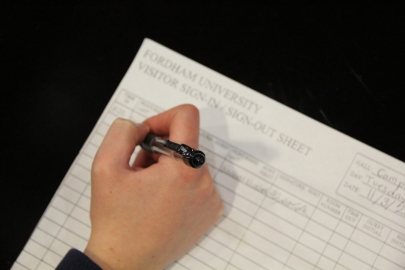By Yasmin Merchant
Fordham University’s Jesuit and Catholic ideologies affect more than just the curriculum. Policies throughout campus, on anything from programming to health services, reflect these principles. And nowhere, perhaps, are students more aware of this Jesuit impact than in residential life.
The Office of Residential Life is in charge of the guest policy, which allows undergraduate residents to host up to two overnight guests of the same sex for two nights within a seven-day period. Overnight guests of the opposite sex are prohibited. Even if a student wants to have an opposite-sex family member as an overnight guest, permission must be granted in advance by the building Resident Director.
Dean of Students Christopher Rodgers provided some explanation on on the guest pass policy, saying, “While students ought mainly to be focused on their studies even in the residence halls, they may, of course, have guests visit from time to time where they live on campus.”
“The guest pass policy works well to allow these guests,” he added. “But students sometimes have questions about the policy prohibiting overnight visitors of the opposite sex: a rule we predictably find wildly popular with parents but perhaps less-so with students.”
Though Jesuit universities are all, by definition, guided by the same principles, their guest policies, and how strictly they are enforced, differ, according to some students.
Boston College, the College of the Holy Cross and Fairfield University, for example, have guest policies similar to Fordham’s, but some students said not all of them strictly enforce the policies.
Alexandria Catherall is a student at the College of the Holy Cross where, although the policy states that only guests of the same sex are allowed, “there isn’t anyone who is walking around knocking on doors making sure that is the case.”
“I believe that’s because the school trusts students to make responsible decisions regarding policies about guests,” she said.
Former Holy Cross student Naomi Gaspard remembered the guest policy being more concerned about the safety of guests on campus.
“They would prefer that you register them as a guest so that if something happened (we had to go on lockdown, or someone is looking for them), we know that the guest is accounted for,” she said in an email. “For the most part people are not always registering their guests and the staff didn’t seem to care if there were overnight guests of the opposite gender — they had bigger things to worry about.”
The situation is similar at Boston College. “I don’t agree with the policy,” said Boston College student Pavel Gorelov, “but it doesn’t really matter since no one enforces it anyways. There are no inspections of dorm rooms or apartments at nighttime to ensure that there are no guests sleeping over, so it’s a rule entirely in theory and not in practice.”
Rodgers acknowledges that other institutions have fewer restrictions. However, he said, Fordham believes that the limitation on overnight guests is a good balance for students to maintain some level of independence while respecting the privacy of roommates and the overall safety of the community.
“This community standard is also very much in line with the values the university holds dear: encouraging the kind of respect one should show one’s self and others in relationships,” Rogers said. “This is especially important in light of recent national concerns over student consumption of alcohol and sexual misconduct.”
Georgetown University and Santa Clara University’s policies differ from other Jesuit universities. Though Santa Clara does have rules against cohabitation in residence halls, the policy does not differentiate between guests of the same sex and opposite sex. The policy reads “Guests of residents are permitted to stay overnight in the residence halls. Any guest who intends to stay longer than three consecutive nights or for more than a total of seven nights each academic year must obtain prior written permission from Residence Life staff.”
Georgetown student Catherine Moley agreed with her school’s guest policy. “I think it would ridiculous if a girl could not bring a boy into her room. We are all adults and should have the right to bring whoever we want into our rooms,” she said.
Georgetown student Alexandra Moran said that residents must sign in guests if they don’t live in the building “but they do not care about the gender of your guest.” She also agreed with her school’s policy, “especially because I’m paying room and board so I should get to decide who I have over.”
Rodgers points out that roommates and parents are also paying for the room. “The majority of complaints brought to staff have little to do with the minor restrictions imposed by these rules,” Rogers said. “But you had better believe we do hear instead about problems between room and suitemates when students fail to show proper respect for one another when it comes to visitors and guests.”

